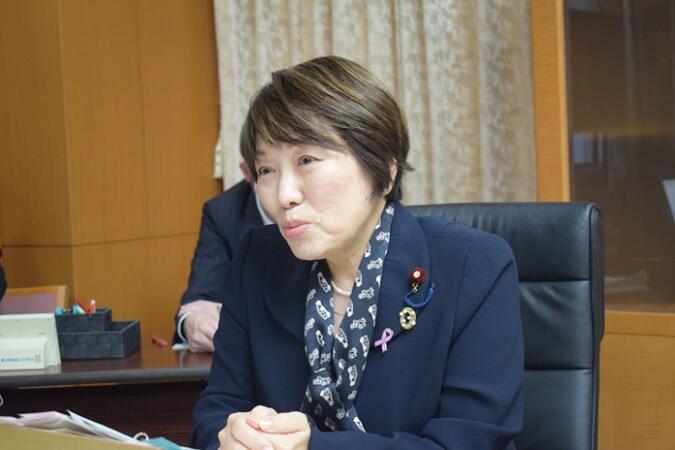House of Representatives member Toshiko Abe has been appointed as the Minister of Education, Culture, Sports, Science, and Technology in the second Ishiba Cabinet. Here, she gives an interview to the press corps.

— What is your favorite motto?
My favorite quote is from Helen Keller: "Optimism is the faith that leads to achievement. Nothing can be done without hope and confidence." I believe that hope is extremely important for people and society to clear a path to the future. Therefore, I intend to carefully address each important issue, including improving teachers' working environment and reducing the burden of education costs. We need to improve Japan's overall research capabilities, and realize a nation founded on sports, culture, and arts.
— How should future university policy be promoted?
The nature of Japanese and U.S. universities is totally different. In the United States, the workload for research and education is clearly divided. Although university presidents and the like may talk a lot about research, only about 4% of undergraduates become researchers. In other words, education is geared toward becoming a functioning member of society. University professors must be able to clearly separate their teaching and research responsibilities; otherwise, their work will overlap, leaving less time for research. The quality of education will also decline. We need to gradually push reforms of the university system. Additionally, students would be better served if graduating a university was made a little more difficult than getting into university. I want to create a system that helps students study hard from the time they enter into a college. I would like us to commit to creating diverse content-rich research universities, while deepening exchanges with foreign countries. Undergraduate students must have a proper focus on education.
— Can you tell us about gaining a Ph.D. in the U.S. and your experience about university work in Japan?
When I got my nursing certification at university in the U.S., even though I was working, I studied more than I have ever had in my life. The students I had in my university teaching days are active in various fields. I think it is important to engage in areas where you excel. When I was teaching, I told my students to do whatever they wanted to, and now they're highly active in many different fields. I stressed presentation skills in education. I kept motivating them to succinctly tell a coherent story and to get the facts right. Education and research are important for developing specialized fields and it is also important to awaken people's curiosity. I'm always thinking about how I can encourage that.
— Can we institutionalize the separation of education and research?
I understand that efforts are already underway for this, and discussions are ongoing on whether there is a need for institutional reforms. Actually, I believe that teaching and research need to be separated to reduce the burden on professors and create incentives for universities. Furthermore, I think that university salaries should be increased to some extent. There are many researchers who believe that it would be better to go abroad if they want to specialize solely in research. Therefore, better salaries would help.
I recently met Professor Shinya Yamanaka and his group. Our discussions included the topic that Japanese academia lacks proper pay differentials. It's much better for people to work in a private industry than in such kind of an environment out of duty. We discussed about how this is also contributing to the decline in Japan's research capacity. One of the issues that we're exploring is how we can work on that.
— What should be done to promote research in Japan?
The government needs to properly invest in fundamental research in science. Competitive funding doesn't mean that outcomes are immediately visible. Sometimes, they can take up to 100 years. We want to ensure to include that perspective in our decisions. At the same time, it may be a good idea to move forward with cross-appointments with the private sector, which would encourage companies to put in more funding. We're in the process of investigating the salary structure for cross-appointment. We want to create a system in which researchers can be properly enriched.
This article has been translated by JST with permission from The Science News Ltd. (https://sci-news.co.jp/). Unauthorized reproduction of the article and photographs is prohibited.




